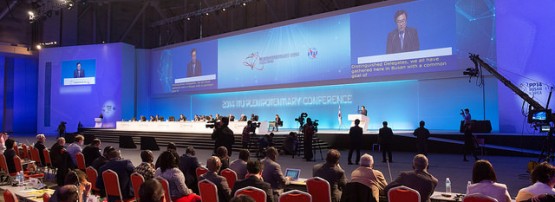
ITU’s 19th Plenipotentiary Conference was held in Busan, Republic of Korea, from Monday, 20 October to Friday, 7 November 2014.
Held every four years, the Plenipotentiary Conference is the top policy-making forum of the ITU where ITU Member States decide on the future priorities of the organization, elect its senior leadership for the coming 4-year term, and approve budgets and other plans.
The marathon three-week conference attracted 2 505 delegates from 171 countries. Dignitaries present included the President of the Republic of Korea, Park Geun-hye, Rwanda’s President Paul Kagame, 76 government ministers, 36 deputy ministers, and 56 ambassadors.
APNIC is a D-Sector Member of the ITU, which affords observer status at the meeting between Member States.
APNIC activities at the PP-14 included:
- APNIC’s Internet Policy Development Consultant, Adam Gosling, covered three weeks of Plenaries, Working Groups and AdHoc sessions during the Plenipot Conference and provided daily public reports on the developments, raising issues of interest to APNIC Members and that could have impact or affect the Internet ecosystem in general
- Throughout this time, Adam met with a large number of Asia Pacific delegations, newly elected ITU officials, and APT Secretary General and Deputy Secretary General candidates. He discussed with them APNIC’s role as a Regional Internet Registry, its mission and activities; how APNIC can support IP related activities in their country or region, in particular IPv6 deployment; and provided advice and expertise on Internet matters when required
- Adam coordinated with staff and members of the Internet community, embedded in governmental or sector member delegations and help to canvas their opinions on different PP-14 Proposals
- During the final week, the APNIC delegation was completed by Director-General Paul Wilson and Strategic Engagement Director Pablo Hinojosa. The three staff members held a number of side meetings, including:
- A series of meetings to discuss APNIC activities in the Pacific, IXPs, IPv6 promotion, regional infrastructure development, and other issues with delegates from Vanuatu (the Office of the Government Chief Information Officer and the Office of the Telecommunications and Radiocommunications Regulator); Samoa (CEO, Ministry Of Communications & Information Technology); and Papua New Guinea (National Information & Communications Technology Authority)
- The Chairman of the Bangladesh Telecommunication Regulatory Commission and members of the Bangladeshi delegation to discuss IPv6 deployment; training; access and development in Bangladesh; the timetable for 4G/LTE deployment in the country; and the need for proactive IPv6 planning
- The incoming ITU Regional Director for Asia Pacific to discuss ongoing collaboration between ITU and APNIC
- The Hon Malcolm Turnbull, Minister for Communications, Australia, to thank him for his support and participation at APNIC38 and update him on APNIC activities since then.
- The Vice Minister for Policy Coordination, Ministry of Internal Affairs and Communications, Japan and officials from Ministry of Communications, Japan
- Officials from the Department of Communications, Ministry of Communications & Information Technology, India to discuss the proposal that the Indian delegation brought to PP-14
- A candidate for Secretary General, Asia Pacific Telecommunity, (APT) currently Deputy Permanent Secretary of the Ministry of Information and Communication Technology, Thailand
- Informal discussion with members from many delegations, including Korea, USA, UK, Sweden, Malaysia, China, Australia, and New Zealand
- CEO and representatives of the Internet Society (ISOC) and its chapters
- Representatives from GSMA to discuss IPv6 for mobile operators and possible APNIC contribution to GSMA training programme
- Several APT, I* and NRO coordination meetings
The views expressed by the authors of this blog are their own and do not necessarily reflect the views of APNIC. Please note a Code of Conduct applies to this blog.
